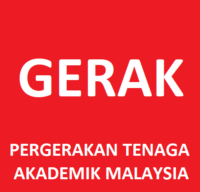Recently, French Melaka-based historian Serge Jardin exposed, yet again, the erroneous content of an oral presentation made by an emeritus professor at a Malaysian public university.
Criticisms were centred on alleged factual errors, the absence of references to support these “facts”, and the overall lack of rigour in how the research findings were presented.
GERAK reiterates that this is the result of a fundamental crisis in Malaysian academe. Critical thinking, analytical rigour, and academic honesty continue to be neglected in Malaysian higher education.
Our public university lecturers take pride in publishing a lot. For example, with every promotion exercise, they brag about how many articles they can produce within one academic year. They also regularly present conference papers and give public talks around the country.
However, these “scholarly” publications and activities are increasingly being exposed for their fraudulent content, disjointed analysis, mediocrity, and irrelevance. For instance, when it comes to alleviating the current ethno-religious divisions that are tearing our nation apart, are these “scholarly” productions making a difference?
These research trends are especially pronounced in the social sciences, and within the public university system. However, the problem exists within the private higher education system as well. Such trends are also radiating across the natural science disciplines. Most importantly, publishing erroneous research and the misrepresentation of facts must be loudly and clearly exposed for what they are, i.e. academic fraud.
GERAK wishes to reiterate that it is the duty of all Malaysians to expose academic fraud. This includes academics themselves. They are expected to back their critical claims with empirical evidence. When this is not the case, fellow academics are expected to expose both the publications and those responsible.
Furthermore, there must be a concerted joint effort by lecturers, heads of departments, deans, top university management and the Government of Malaysia to uphold this spirit of excellence. Scholars and politicians must systematically denounce academic fraud, and consistently publicise such transgressions whenever they are uncovered.
In fact, GERAK demands that the higher education industry make it a priority to consistently expose the shameful and persistent occurrence of sloppy research produced by our universities. Also, top university management and the Ministry of Higher Education must be proactive in publicly exposing and dismissing fraudulent professors when they are repeat offenders.
GERAK also questions the inaction taken by public universities and other relevant authorities, against scholars who widely promote their fraudulent research. In many cases, such research was publicly funded. Therefore, the question of academic honesty becomes both a moral and national concern, answerable to all citizens of Malaysia. When the allocation of public funding can no longer be justified on ethical grounds, it is akin to committing fraud to the Malaysian public at large.
Furthermore, it is unclear if these fraudulent academics have undergone disciplinary action, been demoted, or even dismissed from service. Are these numerous cases of academic fraud simply swept under the carpet? If so, this practice must stop.
Malaysian taxpayer’s monies are squandered when academic fraudsters continue to “peddle” their unethical trade. After all, nation-building is a delicate and long process which requires honest intentions and good practices.
Intentions and practices must be nourished by an inclusive, moderate, and intellectually vibrant learning environment. Malaysia’s schools and universities must helm this positive learning environment. Such conditions would provide healthy platforms for public discourse and intellectual interaction. These are vibrant spaces that facilitate controversial but healthy debates on important socio-political themes.
Furthermore, when “bad” research is conducted by high-ranking scholars from our public universities, it is natural for the public to question the legitimacy of their high salaries, allowances, and perks.
GERAK questions how fraudulent academicians manage to become full professors in the first place, let alone remain Professor Emeriti. In this situation, the profession of academia becomes collectively tainted, and the public loses respect for scholars.
In many countries, dishonest Emeriti are stripped off their accolade. GERAK stresses that when academic fraud is normalised, the ordinary Malaysian loses when the country is internationally embarrassed and globally ridiculed. In addition, in a country which is already ethnically and religiously polarised, fraudulent research has the potential to further mislead and polarise communities, resulting in social unrest and violence.
Furthermore, the obsession of top university management and the Ministry of Higher Education, with the global university ranking system (GURs) tends to exacerbate this crisis in quality research and tangible output. The push to publish more has resulted in a value system that rewards quantity over quality.
The academy has become obsessed with meeting KPIs, attaining administrative positions, and moving up the promotion ladder at all costs. Academics who strive to be noticed by their political “masters” in Putrajaya prioritise these gains over the dignity of academic honesty and genuine scholarly pursuits.
GERAK realises that there has been widespread apathy in exposing academic fraud. We strongly believe that when a scholar is publicly criticised for the analytical, empirical, and interpretive presentation of their work, the scholar in question must respond. He or she should take pride in publicly defending their perspective. They must support their interpretations with empirical evidence. This is a very basic practice in academe.
Public debate is the cornerstone of higher education. Universities are supposed to be “safe spaces” to facilitate this, and more so within the public university system. It is time for Malaysia’s academic community to embrace these values. It is time to stop the growing spread of mediocrity in the country.
This statement has also been published in Free Malaysia Today, The Malaysian Insight, Malaysiakini, Aliran

